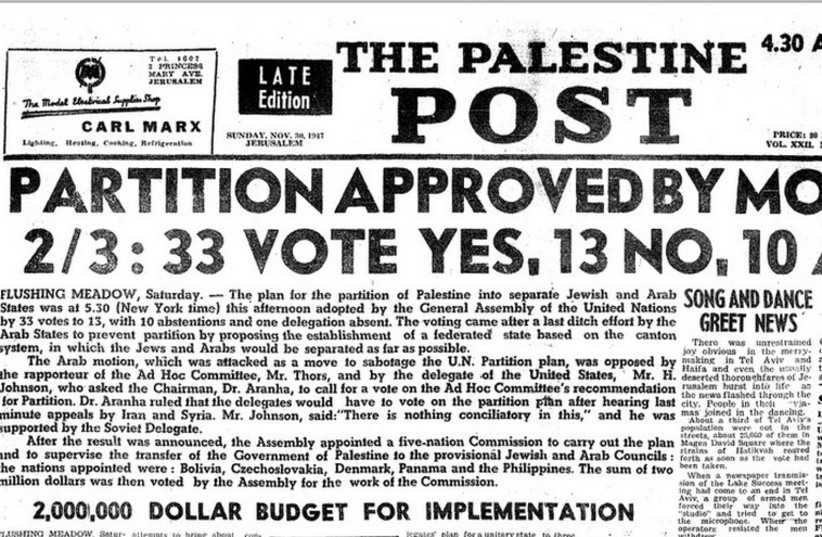‘Insanity is doing the same thing repeatedly and expecting different results,” Albert Einstein once allegedly stated. And as we approach 2025, here we go again.
The United Nations General Assembly announced it will host a June conference to discuss the two-state solution, a decades-old proposal for the Israeli-Palestinian conflict. UNGA President Philémon Yang announced the initiative with grandiose rhetoric, urging both parties to recommit to negotiations and a peaceful resolution.
“After more than a year of war and suffering, realizing this vision is more urgent than ever before,” Yang said.
He described the ongoing denial of Palestinian statehood as a perpetrator of violence and despair, effectively giving carte blanche to Palestinian violence against Israelis – comments that echo what UN Secretary-General Antonio Guterres stated last October, merely weeks after Hamas terrorists crossed Israel’s border and raped, mutilated, murdered and kidnapped over 1,000 civilians, including women and children, and soldiers.
“It is important also to recognize the attacks by Hamas did not happen in a vacuum,” Guterres famously said.
Yang claimed the two-state solution ensures Palestinian self-determination while safeguarding Israel’s security.
But the announcement, while dressed in the language of hope, reeks of hollow moral grandstanding that ignores the realities on the ground and the UN’s culpability in perpetuating this conflict.
The two-state solution, long the UN’s focus, consistently fails due to Palestinian leadership’s refusal to recognize Israel and ongoing corruption and incitement. Instead of addressing these issues, the UN has acted as an enabler.

Sticking to the status quo
The truth is stark: the two-state solution has become a diplomatic euphemism for maintaining the status quo. While Yang stressed dialogue, he conspicuously omits any serious critique of the Palestinian Authority’s kleptocratic governance or Hamas’s terrorist regime in Gaza. No state should be expected to negotiate under fire, yet Israel is routinely pressured to do so as rockets fall on its cities and its citizens are slaughtered.
Yang’s comments praising the Palestinian struggle and decrying Israeli actions betray a glaring bias. While he stresses the importance of dialogue, he omits the fact that Israel has faced unrelenting attacks. The UNGA’s tendency to vilify Israel while excusing Palestinian extremism makes any serious discussion about peace a farce.
Reut Shapir Ben Naftaly, representing Israel on Tuesday, also called out the hypocrisy, stating that in the coming week, the Assembly would host three meetings focused on the Middle East, centered on resolutions that exhibit a “blatant disregard for the truth.” She emphasized that, following October 7, the UN’s deeply entrenched anti-Israel bias has been glaringly exposed.
Yang’s remarks, with their selective moral outrage, ignore the hundred-plus Israeli hostages still held in Gaza whose plight has been sidelined in global discourse. It seems the UN’s commitment to human rights skips over Israeli victims when crafting its narratives.
The planned June conference will likely follow the UN’s usual script: a parade of resolutions condemning Israel, sanctimonious speeches, and no real accountability for Palestinian leadership or their terrorist proxies. If the UN truly wanted to contribute to peace, it would focus on dismantling terror networks, ensuring that aid reaches civilians instead of fueling violence, and genuinely supporting Israel’s right to security.
The hypocrisy surrounding this upcoming conference is particularly apparent when considering recent history. As the UN decries Israel, it continues to fund entities and initiatives in Palestinian territories with little oversight, allowing resources to be siphoned into terror infrastructure (UNRWA anyone?).
The result? Billions in aid funneled into a society where martyrdom is celebrated, and peace is an afterthought. Meanwhile, Israel is expected to negotiate with a partner that not only denies its right to exist but actively seeks its destruction.
The UN was founded on the principle of safeguarding peace and protecting human rights. But its treatment of Israel underscores how far it has strayed from these ideals.
The June conference is a charade, a testament to the UN’s irrelevance in achieving peace in the Middle East. The organization has shown that it lacks both the will and the credibility to address the conflict. Israel, meanwhile, will continue to fight for its survival.
